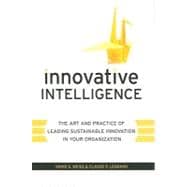
Note: Supplemental materials are not guaranteed with Rental or Used book purchases.
Purchase Benefits
Looking to rent a book? Rent Innovative Intelligence The Art and Practice of Leading Sustainable Innovation in Your Organization [ISBN: 9780470677674] for the semester, quarter, and short term or search our site for other textbooks by Weiss, David S.; Legrand, Claude. Renting a textbook can save you up to 90% from the cost of buying.
Claude P. Legrand is the founder and President of Ideaction Inc., a consulting firm which specializes in sustainable innovation. For over 20 years he has been one of North America's leading experts in practical innovation and is an acclaimed and frequent conference presenter. He leads a team of experienced consultants who help organizations become innovation-capable and deliver major innovation projects. In 2007, he was the founding Program Director of the Centre of Excellence in Innovation Management at the Schulich Executive Education Centre. For more information, please visit www.ideaction.net.
PREFACE.
A Description of the Book Innovative Intelligence.
Who Should Read This Book.
How to Read This Book.
PART ONE: CLOSING THE INNOVATION GAP.
CHAPTER ONE: THE INNOVATION GAP.
The Innovation Challenge.
What Is Innovation?
Innovative Thinking Makes Innovation Happen.
The Evidence Is in—We Are Underachieving.
Try It Another Way.
Conclusion.
CHAPTER TWO: LEADING THROUGH COMPLEXITY.
Why Complex Issues Are So Challenging.
Complicated vs. Complex Issues.
Common Mistakes.
Conclusion.
CHAPTER THREE: ACCESSING INNOVATIVE INTELLIGENCE.
Intelligence: Who Knows?
Leaders Require Three Intelligences.
Leaders Need to Think About Thinking.
Conclusion.
CHAPTER FOUR: ECLIPSE OF INNOVATIVE INTELLIGENCE.
Eclipse #1: The School System Made Me Do It.
Eclipse #2: The Analytical Intelligence Paradox.
Eclipse #3: Impact of High Negative Stress.
Conclusion.
PART TWO: INNOVATIVE THINKING.
CHAPTER FIVE: INNOVATIVE THINKING: AN OVERVIEW.
Characteristics of an Eff ective Innovative Thinking Model.
Key Success Factors for Innovative Thinking.
Conclusion.
CHAPTER SIX: STEP 1: FRAMEWORK.
Understanding Framework.
The Context.
The "How To . . .?" Question.
The Boundaries.
The Type of Solution.
The Owner or Decision Maker
The Project Charter.
Leveraging the Three Intelligences in the Framework Step.
The Leader's Roles in Step 1: Framework.
Conclusion.
CHAPTER SEVEN: STEP 2: ISSUE REDEFINITION.
The Five Areas of Focus in Issue Redefinition.
Leveraging the Three Intelligences in the Issue Redefinition Step.
The Leader's Roles in Step 2: Issue Redefinition.
Conclusion.
CHAPTER EIGHT: STEP 3: IDEA GENERATION.
Idea Generation Is a Rigorous Process.
Stage 1: Prepare Thoroughly.
Stage 2: Introduce the Process.
Stage 3: Generate Many Ideas through Divergence.
Stage 4: Discover Meaningful Solutions through Convergence.
Working Alone on Idea Generation.
Leveraging the Three Intelligences in the Idea Generation Step.
The Leader's Role in Step 3: Idea Generation.
Conclusion.
CHAPTER NINE: STEP 4: IMPLEMENTATION PLANNING.
Stage 1: Confi rm the Preferred Idea.
Stage 2: Engage in Risk Analysis and Develop Mitigating Strategies.
Stage 3: Present the Innovative Solution for Approval.
Stage 4: Ensure an Eff ective Handoff to the Team that Focuses on Change Implementation.
Leveraging the Three Intelligences in the Implementation Planning Step.
The Leader’s Role in Step 4: Implementation Planning.
Conclusion.
PART THREE: MAKING INNOVATION HAPPEN.
CHAPTER TEN: MAKING INNOVATION HAPPEN: AN OVERVIEW.
Four Essential Organizational Enablers to Make Innovation Happen.
Sustaining Innovation.
Conclusion.
CHAPTER ELEVEN: LEADING INNOVATION.
Leading Self.
Leading Innovation Teams.
Leading Intact Work Units.
Leading Enterprises for Innovation.
Conclusion.
CHAPTER TWELVE: CULTURE OF INNOVATION.
What Is Culture?
How a Culture Can Suppress Innovation.
What Is a Culture of Innovation?
How an Existing Culture Can Be Transformed to a Culture of Innovation.
How to Develop a Leadership Culture of Innovation.
Conclusion.
CHAPTER THIRTEEN: ORGANIZATIONAL PRACTICES FOR INNOVATION.
Executive-Level Organizational Practices.
Organizational Practices in Core Functional Areas.
Organizational Practices in Support Functional Areas.
Innovation-Specifi c Organizational Practices.
Conclusion.
CHAPTER FOURTEEN: THE INNOVATION PLAN.
Guiding Principles for an Innovation Plan.
Key Elements of an Effective Innovation Plan.
How to Develop the Innovation Plan and Who Should Lead It.
When Should an Innovation Plan Be Developed?
Pulling It All Together.
INDEX.
ABOUT THE AUTHORS.
The New copy of this book will include any supplemental materials advertised. Please check the title of the book to determine if it should include any access cards, study guides, lab manuals, CDs, etc.
The Used, Rental and eBook copies of this book are not guaranteed to include any supplemental materials. Typically, only the book itself is included. This is true even if the title states it includes any access cards, study guides, lab manuals, CDs, etc.